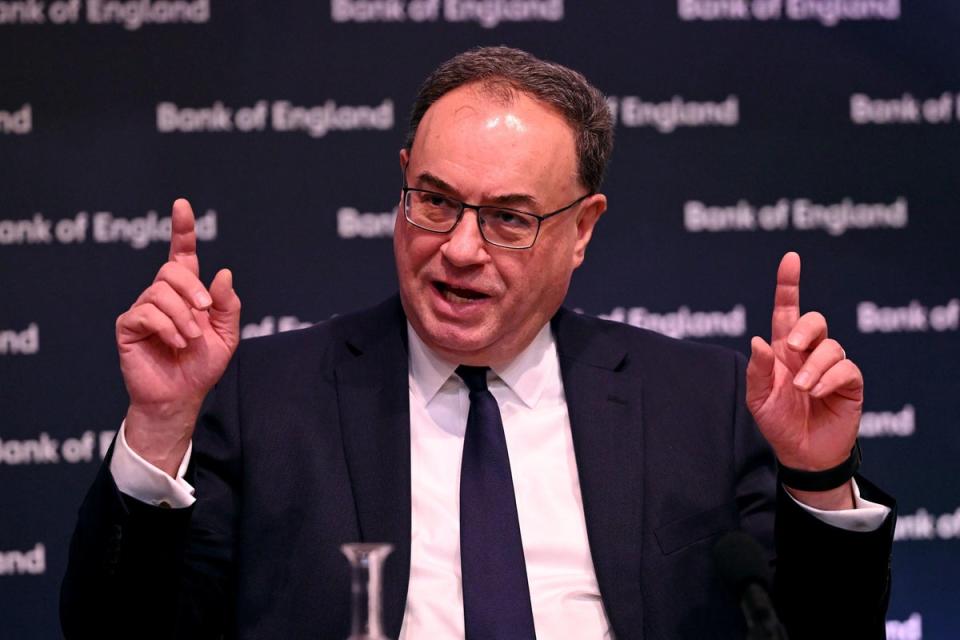UK house prices: How interest rate rise will affect property market and mortgages

The Bank of England’s decision to hike interest rates to a 15-year high is set to see mortgage payments rise for millions of homeowners.
On Thursday, the Bank confirmed UK rates will rise for the tenth time in a row, to 4 per cent from 3.5, in a bid to control inflation after it reached a record 11.1 per cent in October.
The Bank has faced a tough call over what approach to take, as higher mortgage costs saw the housing market suffer five successive months of falls in property prices.
The IMF reported this week the UK would be the only G7 member to see their economy go backwards this year, with a likely 0.6 per cent contraction. While this would usually lead to calls for interest rates to be cut, the current inflation rate of just over 10 per cent is pushing the Bank to act on its mandate to bring it back towards its 2 per cent target.
Below we look at how the latest interest rate increase could impact the housing market for buyers and borrowers alike.
HOUSE PRICES
After big increases in 2022, the price of the average property in January was £258,297 - down 0.6 per cent on December, and well below the £281,000 figure from last year.
House prices stalled in September, followed by monthly falls of 1.0 per cent in October, 1.2 per cent in November and 0.3 per cent in December.
Further falls are likely now the Bank of England has approved an interest rate rise for the tenth time in a row, as it will likely push mortgage rates up further.
Higher mortgage rates tend to push house prices down as people are less willing to borrow money.
On Thursday, high street lender Santander warned house prices are set to tumble back to 2021 levels, and has set aside more cash for loan losses as it braces itself for a possible rise in the number of borrowers falling behind with repayments.
The Spanish-owned group is forecasting a 10 per cent fall in house prices this year as interest rate hikes dampen demand.

MORTGAGES
Mortgage rates offered by lenders jumped following the mini-Budget last year and borrowing costs have also been increasing as the Bank of England base rate has risen.
This has resulted in a plunge in the number of mortgages being approved. The Bank reported on Tuesday that 35,000 were given the green light in December compared to 46,000 in November, the UK’s lowest since 2009.
UK Finance estimates that some 715,000 borrowers on tracker mortgages will feel the pinch as interest rates rise again. It estimates householders will be paying around £588 more a year on average as a result of the Bank’s announcement.
In addition, the Office for National Statistics has predicted more than 1.4 million households are facing the prospect of interest rate rises when they renew their fixed-rate mortgages this year.
A string of base rate hikes have taken place over the past year, but borrowers on fixed-rate mortgages were cushioned from their immediate impact. Analysts have said some may get a shock when they come to renew.
Labour has said homeowners could face mortgage hikes of up to £14,000 a year as they come off low fixed-rate deals, adding to the squeeze on living standards.
Analysis by the party shows predicted annual increases in costs for a median house purchase at 80 per cent mortgage in every constituency in the UK.
WHAT DOES THE GOVERNMENT SAY?
Downing Street acknowledged the interest rate hike could be “difficult” for mortgage holders.
The Prime Minister’s official spokesman said: “Inflation is the biggest threat to living standards in a generation, so we support the Bank’s action today to help us succeed in halving inflation this year.
“We will continue to take the difficult decisions needed to do everything we can to reduce inflation, including not funding additional spending or tax cuts through borrowing, which only serve to fuel inflation further and prolong the pain for everyone.”
The spokesman added: “This is a difficult time for mortgage holders in the UK. As the Chancellor has said, sound money and a stable economy are the best way to deliver lower mortgage rates and keep down the costs of mortgage payments.
“That’s why we are taking the necessary and responsible action to halve inflation, reduce our debt and get the economy growing.”

WHAT DO THE EXPERTS SAY?
Robert Gardner, Nationwide’s chief economist, said: “There are some encouraging signs that mortgage rates are normalising, but it is too early to tell whether activity in the housing market has started to recover.
“The fall in house purchase approvals in December reported by the Bank of England largely reflects the sharp decline in mortgage applications following the mini-Budget.
“It will be hard for the market to regain much momentum in the near term as economic headwinds are set to remain strong, with real earnings likely to fall further and the labour market widely projected to weaken as the economy shrinks.”
Jeremy Leaf, a north London estate agent, added: “The fizz has certainly left the market, leaving behind more serious needs-driven as opposed to discretionary buyers, coming to terms with more stable mortgage rates and greater balance between supply and demand.
“Looking forward, the outlook for house prices remains fairly steady with no expectation of any dramatic change.”

 Yahoo News
Yahoo News 
